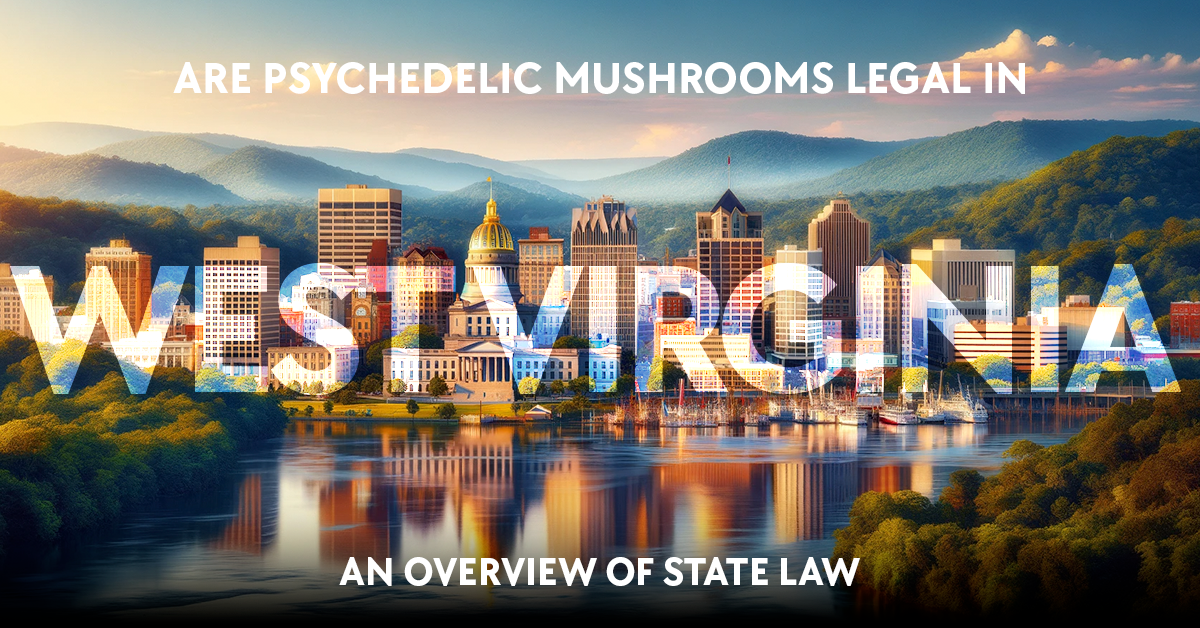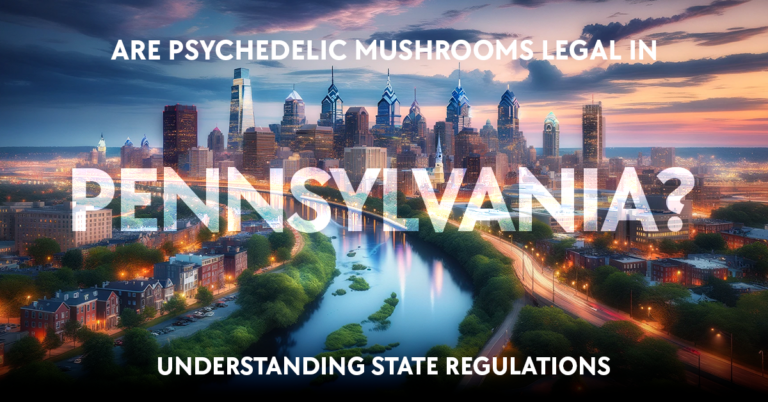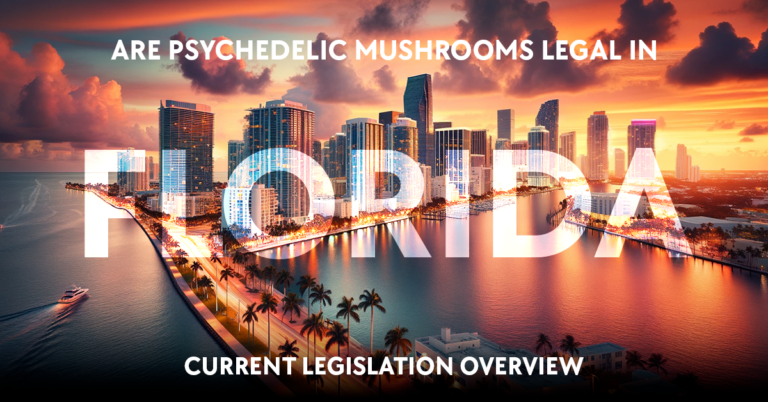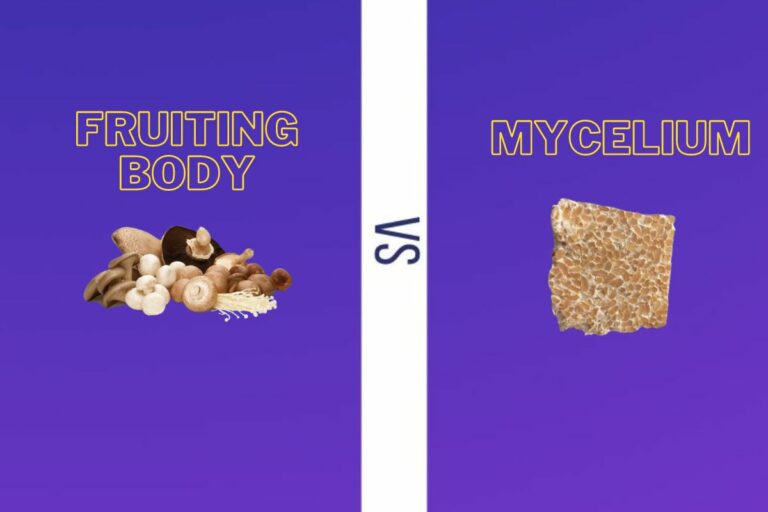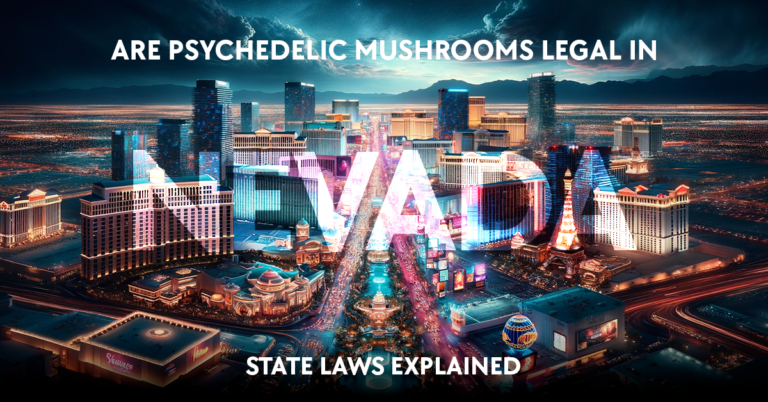In West Virginia, as in many states, the legal status of psychedelic substances like psilocybin mushrooms is a complex issue. Psilocybin is the psychoactive component found in certain species of mushrooms, commonly referred to as “magic mushrooms” or “shrooms.” These mushrooms have been both revered and controversial for their mind-altering effects. As per federal law, psilocybin is classified as a Schedule I substance, indicating a high potential for abuse and no accepted medical use.

However, legal attitudes towards psychedelics are evolving across the United States, with some jurisdictions reconsidering their approach towards substances like psilocybin. It’s important to note that any changes in the legal status of psychedelic mushrooms would occur independently in each state, reflecting the varying perceptions and legislative decisions. Specifically, in West Virginia, psilocybin mushrooms remain illegal for both recreational and medical use. Possession, sale, or cultivation of these mushrooms can result in criminal charges.
Understanding the current laws is crucial if you’re pondering the legalities surrounding psilocybin mushrooms in West Virginia. It’s a dynamic legal landscape that may shift as new scientific research emerges and social attitudes progress. For up-to-date information on the matter, staying informed about local statutes and any legislative discussions regarding psychedelics in West Virginia is recommended.
Legality of Psilocybin Mushrooms in West Virginia
Table of Contents
https://www.youtube.com/watch?v=H0g5Q25PWZk&embed=true
When discussing the legal landscape of psilocybin mushrooms in West Virginia, it is important to understand the current legal status and how state laws intersect with federal regulations.
Current Legal Status
Psilocybin mushrooms, often referred to as shrooms or psychedelic mushrooms, are classified as a Schedule I controlled substance in West Virginia. This classification indicates that they are considered to have a high potential for abuse, no accepted medical use in the United States, and a lack of accepted safety for use under medical supervision. Therefore, the possession, sale, or cultivation of psilocybin mushrooms are illegal in West Virginia, which could lead to criminalization and various penalties. If you are found with these substances, you may face substantial fines and incarceration.
State vs. Federal Laws
Despite the fact that some states are beginning to reevaluate their stance on psychedelic substances, West Virginia has not made any moves to deviate from federal law regarding psilocybin mushrooms. On the federal level, psilocybin remains a Schedule I substance, and thus it is illegal to possess, distribute, or manufacture these mushrooms throughout the United States. You must be aware that regardless of any changes at the state level, federal regulation may still apply, and federal authorities can enforce federal law across all states, including West Virginia.
History of Psychedelic Legislation

The legislative history behind psychedelic substances, particularly psilocybin mushrooms, is a tapestry of changing societal views, scientific development, and legal shifts within the United States. Your understanding of this topic is crucial to comprehending the current legal landscape of psychedelics.
Early Regulations
In the United States, the Controlled Substances Act of 1970 marked a significant starting point for the regulation of psychedelic substances. Under this act, psychedelics, including psilocybin mushrooms, were classified as Schedule I substances. This categorization denotes a high potential for abuse and no accepted medical use, making these substances illegal to manufacture, possess, or distribute.
The initial intention behind these regulations was to curb the widespread use of hallucinogenic substances which were prevalent during the 1960s counterculture movement. Consequently, scientific research into the therapeutic benefits of psilocybin and similar substances was largely halted due to the stringent legal framework and the stigma attached to their use.
Recent Movements
You may have noticed a shift in recent years, with several states and cities exploring decriminalization and even legalization of psychedelic substances. Pioneering this movement, Denver, Colorado, became the first US city to decriminalize psilocybin mushrooms in 2019. Following Denver, Oakland and Santa Cruz in California, as well as Ann Arbor in Michigan, have passed similar decriminalization measures.
The notion of decriminalization typically means that although the substances are not legal, your penalties for possession or personal use are significantly reduced or eliminated. On the path to legalization, Oregon stands out as the first state to not only decriminalize but also legalize the regulated medical use of psilocybin mushrooms as of 2020.
Moreover, there have been movements in other states, including Massachusetts, Connecticut, and California, that express support and are taking legal steps towards decriminalization and research into psychedelic substances. These efforts represent a growing acknowledgment of the potential benefits of psychedelics and a shift towards a more nuanced understanding of their use.
Medical and Therapeutic Research

As you explore the legal status of psychedelic mushrooms, specifically psilocybin, in West Virginia, it’s crucial to understand the landscape of medical and therapeutic research related to its potential uses. This includes clinical studies and the FDA’s stance on such research.
Psilocybin in Clinical Studies
Recent clinical studies have been investigating the therapeutic effects of psilocybin for a variety of conditions, such as depression, anxiety, and PTSD. Psilocybin, the active compound in psychedelic mushrooms, has shown promising results in reducing symptoms of these conditions in controlled environments. For instance, a study reported that psilocybin presented few risks to participants and had potential therapeutic benefits.
FDA Approvals and Initiatives
The FDA has demonstrated interest in the medicinal potential of psilocybin and has even designated it as a Breakthrough Therapy for major depressive disorder, which expedites the development and review process for drugs that could significantly improve treatment outcomes. While this does not equate to approval for medical use, it shows a willingness to consider psilocybin’s possible benefits. Research in this field continues to grow, and the FDA’s evolving position is instrumental in encouraging further studies into its therapeutic use.
Criminal Penalties and Enforcement

In West Virginia, both possession and distribution of psilocybin mushrooms carry significant legal consequences, including potential misdemeanor or felony charges.
Charges for Possession and Distribution
Possession: If you’re found possessing psilocybin mushrooms in West Virginia, you’re likely facing criminal charges. Simple possession can lead to a misdemeanor, attracting fines and potential jail time.
- Misdemeanor: Fines up to $1,000 and/or jail for 90 days to 6 months.
- Felony: Could occur if possession is with intent to distribute. Fines and a sentence of one to five years.
Distribution: Selling or distributing psilocybin mushrooms is considered a more serious offense and typically classified as a felony. This can escalate to stiffer penalties, including longer incarceration periods.
- First Offense: Incarceration for one to five years and/or fines.
- Subsequent Offenses: Enhanced penalties that could double the term of incarceration.
Potential Reforms in Legal Penalties
Discussions on decriminalization have emerged, with some lawmakers considering shifts in regulation to reduce penalties for psilocybin-related offenses. However, as of now, no formal changes have been made to decriminalize or legalize psilocybin mushrooms in West Virginia. Advocacy for reform points to potential therapeutic benefits of psilocybin and seeks to align state law with evolving perspectives on drug policy.
Public Perception and Societal Impact
As you explore the legal status of psychedelic mushrooms in West Virginia, it’s important to consider the societal landscape, which includes shifting public opinion and debates on potential benefits and risks. This understanding can frame the broader discussion of their place in society.
Support for Decriminalization
In recent years, public support for decriminalization of psychedelics has been growing, reflecting a changing societal view on drugs traditionally seen as illicit. Surveys and movements suggest an increasing acceptance of psychedelics from a public health perspective, with an emphasis on potential therapeutic benefits over criminalization. This shift is mirrored by legislative actions in certain localities where initiatives to decriminalize or lower enforcement priorities have been taking root.
Concerns Over Safety and Abuse
Despite the support, concerns about the safety and potential for abuse of psychedelic mushrooms persist, especially without proper regulation. Critiques often cite the need for substantial evidence to assuage fears of addiction and other negative public health outcomes. Discussions on the societal impact of psychedelics are not without consideration of these risks, ensuring that any steps toward decriminalization are taken with ample caution.
Comparative Analysis With Other States
When considering the legal status of psychedelic mushrooms, it’s crucial to compare West Virginia’s stance to that of other states. You’ll see a spectrum of legal frameworks, from progressive legislation fostering decriminalization and legalization to restrictive stances with complete bans.
Progressive Legislation Examples
Oregon and Colorado represent progressive approaches to the legalization of psilocybin mushrooms. In November 2020, Oregon became the first state to both decriminalize the personal possession of psilocybin mushrooms and legalize their supervised use for therapeutic purposes under Measure 109. Following suit, parts of California have moved towards more lenient policies; however, state-wide legalization has not been achieved.
- Oregon: Legalized & decriminalized
- Colorado: Certain cities decriminalized
- California: Some cities decriminalized
Restrictive States and Policies
In contrast, states like Alabama, Alaska, Arkansas, Idaho, and Georgia have upheld stringent laws against psilocybin mushrooms, reflecting a restrictive position. Regardless of the shifting tides in some states, these places maintain the classification of psilocybin as a Schedule I substance, signifying no legal acceptance for either medicinal or recreational use.
- Alabama: Strictly illegal
- Alaska: No decriminalization
- Arkansas: Schedule I substance
- Idaho: Complete ban
- Georgia: No legalization efforts
Natural Occurrence and Cultivation Issues
In West Virginia, the natural occurrence of psychedelic mushrooms and the associated cultivation issues are complex and sensitive topics. They intertwine with local biodiversity and legal frameworks.
Identification of Local Species
Your awareness of the local species of psychedelic mushrooms, such as Psilocybe caerulipes, Psilocybe ovoideocystidiata, and Panaeolus cinctulus, is crucial for identification. These species are often found in the wild, growing in rich and moist woodland areas. For example, Psilocybe caerulipes often grows on decaying hardwood logs. It’s important to correctly identify these species, as they can closely resemble non-psychedelic or even poisonous varieties.
Legal Issues Surrounding Spore Trade
The trade and possession of psychedelic mushroom spores for cultivation purposes are contentious legal matters. In West Virginia, cultivation, sale, and possession of psychedelic mushrooms like Psilocybe cubensis are illegal. However, mushroom spores do not contain psilocybin, the active hallucinogenic compound, which means spores themselves are typically legal for purchase and sale in many states for microscopy purposes. It’s imperative that you understand the regulation in your area, as any step towards germination or cultivation of these spores for the purpose of producing psychedelic mushrooms can lead to legal repercussions.
Frequently Asked Questions
In this section, you’ll find specific information addressing common inquiries about the legal state of psilocybin mushrooms in West Virginia.
What is the legal status of psilocybin mushrooms in West Virginia?
Psilocybin mushrooms are classified as a Schedule I controlled substance in West Virginia, making them illegal to possess, sell, or use within the state’s borders.
Can an individual be prosecuted for possessing psilocybin in West Virginia?
Yes, if you possess psilocybin in West Virginia, you can face prosecution, as it is illegal in the state and considered a serious criminal offense.
Are there any recent law changes regarding psychedelic mushroom use in West Virginia?
No recent legislative changes have occurred in West Virginia to alter the legal status of psychedelic mushrooms; they remain prohibited.
Is it permissible to grow psilocybin mushrooms for personal use in West Virginia?
Growing psilocybin mushrooms for personal use is not permissible in West Virginia and is subject to the same penalties as possession.
Does West Virginia allow the medicinal use of psilocybin under any circumstances?
West Virginia does not currently allow the medicinal use of psilocybin, and it is categorized strictly as a substance with no recognized medical use.
What are the potential legal consequences of distributing psychedelic mushrooms in West Virginia?
Distributing psychedelic mushrooms in West Virginia can lead to severe legal consequences including fines, imprisonment, and a permanent criminal record.

